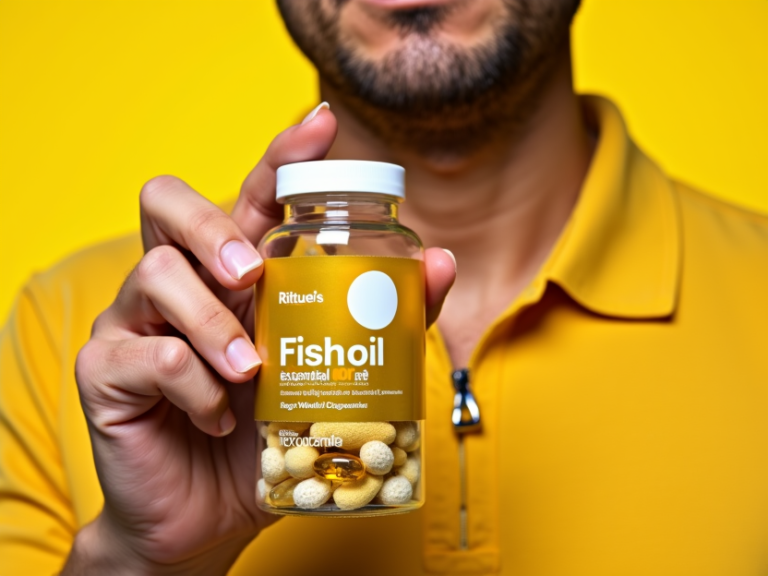Top Fish Oil Benefits for Your Health
Have you ever felt like your body could use a little extra support? Maybe your energy dips midday, or you’ve noticed stiff joints and less mental clarity than before. What if there was a natural solution to help you feel more vibrant, sharper, and healthier overall? Fish oil could be that solution. Packed with omega-3 fatty acids, this supplement is widely known for its impressive health benefits—benefits that can enhance your daily life in ways you didn’t realize you needed.
Whether you’re curious about improving your heart health, boosting your brain function, or even maintaining glowing skin, fish oil is more than just a trendy supplement—it’s a scientifically-backed game changer. Let’s explore the top fish oil benefits and how you can integrate this powerful nutrient into your wellness routine.
Table of Contents
What Is Fish Oil and Why Does It Matter?
Fish oil isn’t just another supplement crowding store shelves—it’s an essential tool for your overall health. Extracted from fatty fish like salmon, mackerel, and sardines, fish oil is rich in omega-3 fatty acids, particularly EPA (eicosapentaenoic acid) and DHA (docosahexaenoic acid). These are the “good fats” that your body needs but cannot produce on its own.
Why You Need Omega-3s
Omega-3 fatty acids are the cornerstone of fish oil’s benefits. They’re critical for reducing inflammation, supporting brain health, and even maintaining cell membranes. If you’ve ever wondered why people tout salmon as a superfood, it’s largely due to its high omega-3 content. Incorporating fish oil into your life—whether through supplements or food—helps fill the gaps in your diet, especially if seafood isn’t a staple on your plate.
Where Fish Oil Comes From
You can reap omega-3 benefits from two main sources:
- Natural Food Sources: Fatty fish like salmon, mackerel, and tuna.
- Supplements: Fish oil capsules or liquid forms, which are convenient for anyone who struggles to get enough omega-3s through food alone.
Top Fish Oil Benefits for Your Health
Let’s dive into the transformative ways fish oil can improve your well-being. Each benefit is backed by science, making it clear why fish oil deserves a place in your routine.
1. Boosts Heart Health
Your heart works tirelessly to keep you alive, so giving it extra support is crucial. Fish oil is renowned for its cardiovascular benefits:
- Reduces Triglycerides: High triglycerides are a major risk factor for heart disease, and fish oil has been shown to lower them by up to 30%.
- Lowers Blood Pressure: Regular fish oil supplementation can help reduce blood pressure levels, especially in people with hypertension.
- Improves Arterial Health: Omega-3s promote elasticity in blood vessels, reducing strain on your heart.
Quick Fact: Did you know that people who regularly consume fish have a 20% lower risk of heart disease? That’s the power of omega-3s.
2. Enhances Brain Function and Mental Clarity
Have you ever experienced brain fog or struggled to stay focused? Fish oil might help clear things up:
- Supports Memory and Cognition: DHA, a key component of fish oil, is integral for brain health and function.
- Reduces Symptoms of Depression and Anxiety: Multiple studies have linked omega-3 supplementation to improved mood and mental well-being.
- Slows Cognitive Decline: As we age, our brain needs more support. Fish oil may help slow memory loss and even reduce the risk of conditions like Alzheimer’s.
Pro Tip: Start your day with a fish oil supplement alongside breakfast to power your brain for the challenges ahead.
3. Reduces Joint Pain and Inflammation
If you’ve ever felt stiffness in your joints or struggled with post-workout soreness, fish oil can offer relief.
- Eases Arthritis Symptoms: Omega-3s have anti-inflammatory properties that can reduce pain and swelling in conditions like rheumatoid arthritis.
- Improves Flexibility and Mobility: By reducing inflammation, fish oil helps improve joint function over time.
- Supports Muscle Recovery: Fitness enthusiasts swear by fish oil to reduce soreness after intense workouts.
4. Improves Eye Health
Your eyes are another beneficiary of fish oil’s omega-3s. DHA is a major structural component of your retina, making it critical for vision.
- Prevents Dry Eye Syndrome: Omega-3s help lubricate your eyes, preventing discomfort and irritation.
- Protects Against Macular Degeneration: Regular omega-3 intake may reduce the risk of age-related vision loss.
Takeaway: If you’re spending hours in front of screens, fish oil could be the key to healthier, more comfortable eyes.
5. Supports Skin Health
Want glowing skin that looks and feels healthy? Fish oil might be your next skincare staple.
- Hydrates and Repairs Skin: Omega-3s help
maintain your skin’s natural barrier, keeping it hydrated and protected against environmental damage.
- Reduces Acne and Inflammation: The anti-inflammatory properties of fish oil can calm redness and irritation, making it a natural solution for clearer skin.
- Protects Against Sun Damage: Omega-3s may also provide some protection against harmful UV rays, reducing the risk of premature aging.
Skin Tip: Pair fish oil with a diet rich in fruits and vegetables for a radiant glow that lasts all year round.
6. Aids in Pregnancy and Early Development
If you’re expecting or planning to start a family, fish oil can be an essential part of your prenatal care.
- Fetal Brain and Eye Development: DHA plays a crucial role in a baby’s brain and eye growth during pregnancy.
- Reduces Risk of Preterm Labor: Studies suggest that omega-3s can help lower the chances of premature birth.
- Supports Postpartum Recovery: Fish oil can also aid in balancing mood and mental health after delivery.
Mom-to-Be Advice: Look for prenatal supplements that include DHA to give your baby the best start in life.
How to Incorporate Fish Oil into Your Routine
Best Food Sources of Omega-3 Fatty Acids
You don’t have to rely solely on supplements to get your omega-3s. Nature provides plenty of options:
- Fatty Fish: Salmon, mackerel, sardines, and herring are top choices.
- Plant-Based Sources: Flaxseeds, chia seeds, and walnuts are excellent for vegetarians and vegans.
- Fortified Foods: Some eggs, dairy products, and juices are fortified with omega-3s.
Pro Tip: Aim to include two servings of fatty fish in your diet each week to meet your omega-3 needs naturally.
Choosing the Right Fish Oil Supplement
When food alone isn’t enough, supplements can fill the gap. Here’s what to look for:
- High EPA and DHA Content: Check the label to ensure the supplement contains adequate amounts of these critical omega-3s.
- Purity and Sustainability: Opt for brands that are third-party tested and environmentally responsible.
- Liquid vs. Capsule: Choose the format that fits your lifestyle best. Capsules are convenient, while liquid forms are easier to adjust dosages.
Bonus Tip: Store your fish oil in a cool, dark place to preserve its potency.
Tips for Maximizing Benefits
- Take with Food: Omega-3s absorb better when taken with a meal containing healthy fats.
- Follow Dosage Guidelines: Start with 250–500 mg of combined EPA and DHA daily, or as recommended by your doctor.
- Be Consistent: Like any supplement, fish oil works best when taken regularly.
Common Questions About Fish Oil and Omega-3s (FAQ)
What are the main benefits of fish oil?
Fish oil is known for improving heart health, enhancing brain function, reducing inflammation, and supporting skin and eye health.
Is fish oil safe for everyone?
Fish oil is generally safe, but if you’re pregnant, nursing, or on medications, consult your doctor before starting supplementation.
How much fish oil should I take daily?
The typical dose is 250–500 mg of combined EPA and DHA, but higher doses may be recommended for specific health concerns.
Can I get enough omega-3 from food alone?
While it’s possible, many people struggle to consume enough omega-3-rich foods, making supplements a convenient option.
What’s the difference between omega-3 and DHA?
Omega-3 is a group of fatty acids, while DHA is one specific type. DHA is especially important for brain and eye health.
Conclusion
Your health is your most valuable asset, and fish oil is one of the simplest ways to protect and enhance it. From boosting heart and brain function to supporting glowing skin and healthy joints, the benefits of fish oil are too significant to ignore. Whether you choose to add omega-3-rich foods to your meals or start taking a high-quality supplement, your body will thank you.


